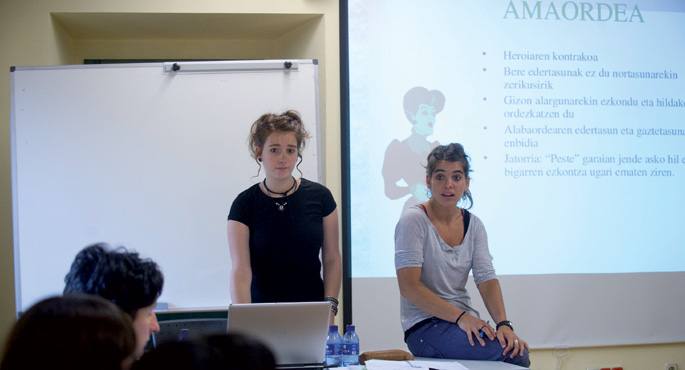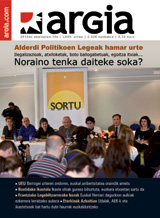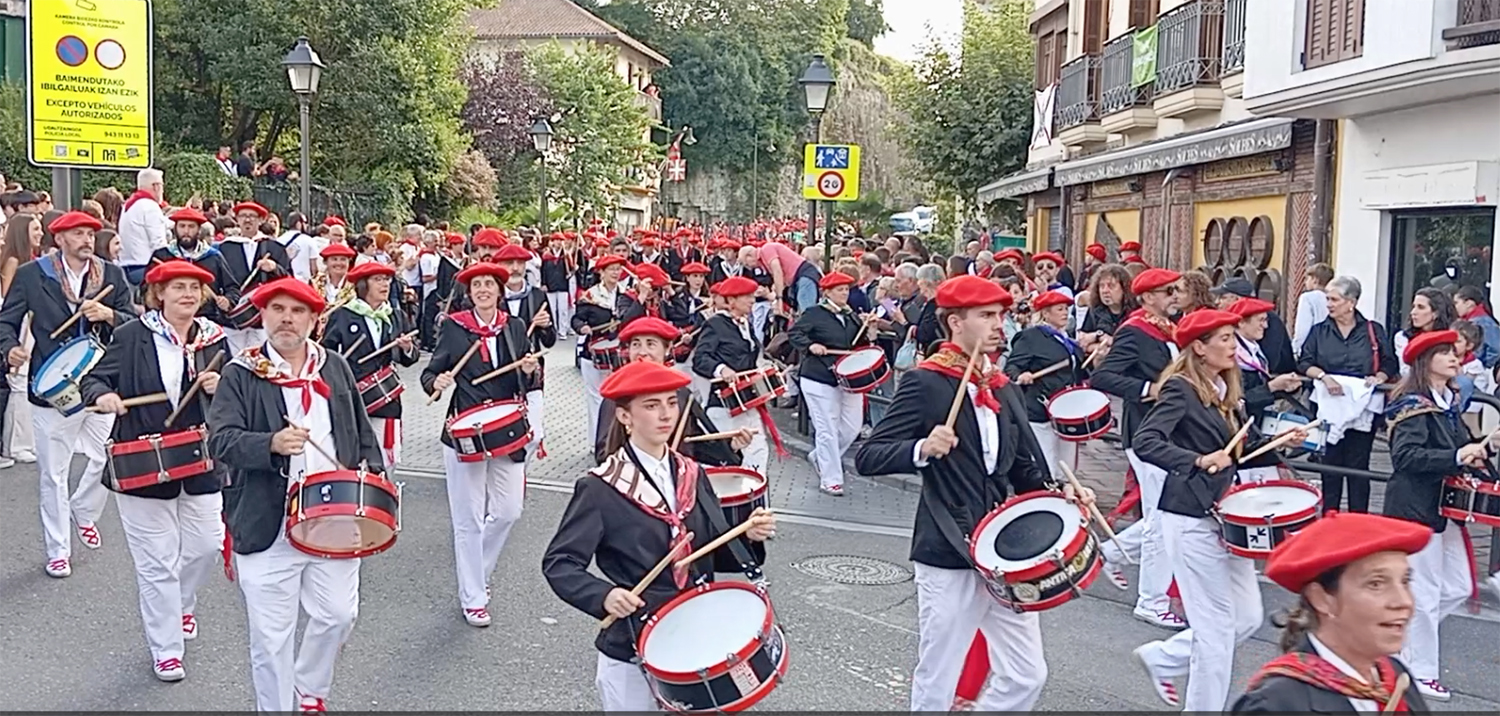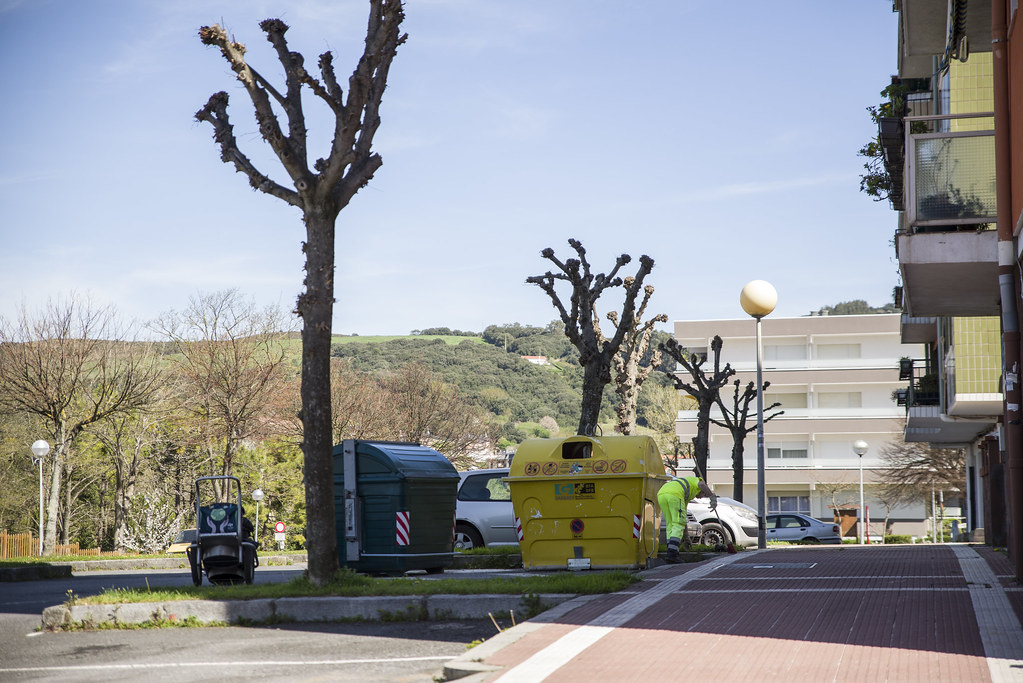There is still something to claim
- In 1973, the Summer Courses were organized in San Juan de Luz. That summer was the birth of the Basque Summer University. It had a clear objective: Creation of the University of the Basque Country. The landscapes of the university and the Basque Country have changed a lot for the better, but there is no Basque University. The end is still there.

40 years ago I was about to do everything or almost everything. There was no unified public university in the Basque Country, the loose, and mostly private faculties. Many spent the years studying on campus outside. As for the supply of Euskera, the desert stands out. There was also more than one who doubted that it was possible to work in Basque the academic content. History, biology, medicine... Teaching in Basque? Today it seems like a stupid question, but 40 years ago it didn't.
In 1973, the UEU was launched with the Summer Courses, and over the years, these 15-day seasonal courses have developed greatly. They then had two goals that are being maintained today. On the one hand, to demand the need to create a Basque University and be an agent in it. On the other hand, make real efforts to unite the Basque and the university. In other words, the Basque scientific community was dispersed in several faculties in the Basque Country and in foreign universities. We had to do a way of bringing Euskaldunes students and teachers together, and that work could be done by the EU. The UEU, besides being a meeting point, would produce, that is, it would produce university topics in Euskera and make them available to the scientific community and society in general.
What is the Basque University? How should it be? We asked Mikel Aizpuru, director of the EU (1996-2000) and author of the book Udako Euskal Unibertsitatea in Basque culture: “There has always been inequality of opinion. At one time, the most widespread demand was that a public university was needed. The UPV/EHU was created and there were different opinions on the table. It was clear that it had to be public, but according to some, in addition to that, it had to have taken over the four provinces of Hego Euskal Herria. The EU contribution was that it should be in Euskera. In addition, a teaching model different from that of France and Spain was represented”. Advertising, territoriality, Euskera and the teaching model were the main axes of the creation of the university. According to Aizpuru, with the creation of the UPV/EHU, the EU was the only reference in favor of an innovative and Euskaldun university. Through the UPV/EHU, many professors and students who were outside the university returned, and on the other hand, the public institution left Euskera for later.
What is the Basque University like?
These are things that go back decades. The journey has been long and the Basque University has had many formulations. Mikel Aizpuru thus summarizes the pulse that exists around this claim: “In the opinion of some, the Basque University should be the meeting point of the university students who work in Euskera, and there are others who believe that a new university should be done, that it should be public and that it should provide official titles. The EU defends the second, but it is difficult to do so, resources are limited and the efforts made have not yielded good results.” The last test was conducted for the 2010-211 course. The Foundation for the University of the Basque Country (AEK, EKT, Elkar Fundazioa, Confederación de Ikastolas de Euskal Herria, Ipar Hegoa Foundation, Kontseilua, National Debate Forum and UEU) announced that this course would launch eight degrees in Tolosa. That was not the case, and at the moment this track is cut off. Karmele Artetxe, current EU director, tells us: “Although the vocation is to make a public university, the tendency is to make a small private university to seek legal loopholes. The proposal to set up the university had to take it to parliament, but we have not come to it. The degrees are ready, but other jobs have to be done.”
Without recognition of the Basque Government
The Department of Education of the Basque Government has withdrawn a grant of EUR 180,000 to the EU this year. It is not a subsidy of any kind, it was a full, nominative item. In Artetxe's opinion, running out of help means two things: “They have taken away what is essential for our survival, because it affects the EU’s infrastructure and leaves the contribution, the path of the organisation, unrecognised. From now on we have to present concrete projects to the calls of the government and of the deputies, but we will not have the recognition we obtained in 1998 from the Basque Government.” The impact of the disappearance of the aid in the EU is clear. The contracts of a worker in the residences of Pamplona and Baiona have been suspended, while those of around 18 workers in the residences of Eibar and Bilbao have been affected by the application of ERE. However, they do not want cuts to influence the pace of work. The residences of Baiona and Pamplona/Iruña will be maintained and through its partners (UEU has about 1,200) the planned activities will be continued.
Baionan, Eibarren eta Iruñean egingo dira UEUko ikastaroak, ekainaren 26an hasi eta uztailaren 27ra arte. Gaiak, beti bezala, ugari eta askotarikoak: kalamua, Txillardegi, ETBren 30 urteak, sexologia, haur psikologia, robotika... Ondoko lerroetan historiografia feministari buruzkoa eta bioeraikuntza ikastaroa aurkeztuko dizkizuegu.
UEUk Gite-Ipesekin (Gizarte Ikerketarako Talde Eragilea) elkarlanean antolatu du Euskal emakumeen historia osatzen ikastaroa. Eibarren izango da uztailaren 9an eta 10ean. Gite-Ipesek Euskal Herriko emakumeen historiaz pare bat liburu argitaratuak ditu, arrakasta dutenak. Kontua da, liburuok jasotzen dituzten eduki berrienak 1990eko hamarkadakoak direla. Azken bi hamarkadatan zein ikerketa egin diren, alegia, historiografia feministak Euskal Herrian zein pauso eman dituen jakiteko garaia dela pentsatu du Gite-Ipesek. Besteak beste, ikastaroa baliatu nahi dute horretarako.
Bost hizlari izango dira eta bakoitzak bere ikerketen ildoak azalduko ditu: Anuntxi Arana (Sexismoa, gaitz zahar eta iraunkorra), Marikita Tambourin (Emazteak euskal eremuan: Ipar Euskal Herrian), Anne-Marie Lagarde (Sexuen arteko simetria euskal jendartean), Oihane Valero (Emakumeak eta lana: aldaketak eta ekarpenak) eta Amaia Andrieu (Euskal feminismoaren bilakaera. Emakumeen antolaketa eta borrokak). Antolatzaileen asmoa hizlariek eta ikastaroko parte-hartzaileek jakingaiak elkarbanatzea eta eztabaidatzea da; ikasleak ere halakoak espero dituzte: euskal emakumeen historia lantzen ari direnak edo landuko dutenak.
Historiografia feminista landuko dute eta hala azaldu digu Haizea Belza Gite-Ipeseko koordinatzaileak: “Gure asmoa ez da emakumeak non zeuden, zein lan egiten zuten besterik gabe kontatzea, hau da, emakumeen egunerokoaren deskribapena egitea. Emakumeek bizirauteko estrategiak garatu dituzte historian zehar eta guk horien zergatiak aurkitu nahi ditugu. Emakumeen historia deskribatze hutsa egiten baduzu, ez dakizu adibidez zergatik emakumeak etxean egiten zuen lan eta ez hainbeste industrian”.
Natura eta gu izorratu gabe eraiki
Bioeraikuntza eta geobiologia: bizitzeko eraiki ikastaroa uztailaren 11n eta 12an Eibarren eskainiko dute. Inhar Agirrezabal Saenz de Santamaria izango da irakasleetako bat, Arkitekturako eta Bioeraikuntza masterreko ikaslea. Agirrezabalek badaki nolako eraikuntza estiloa ez duen gogoko, gaur egunekoak baino arkitektura eta eraikuntza prozesu zentzuzkoagoak aldarrikatzen ditu. UEUko ikastaroan horixe nahi dute egin, bioeraikuntzaren oinarri nagusiak azaldu, parte-hartzaileak bioeraikuntzaren onurez jabe daitezen. Ez da ikastaro arras zientifikoa izango, edozein herritarrentzako modukoa prestatu dute. Bioeraikuntzaren aldekoen ustez, oraingo arkitektura eta eraikuntza moduak munduarekiko eta gizakiarekiko harremana eteten du. Azken urteotan eraikuntza, Agirrezabalen ustez, irizpide ekonomikoak kontuan hartuta egin da eta ondorioz benetako erabiltzaileak eta helburuak zein diren ahaztu egin zaigu. Bioeraikuntzak beste begi batzuekin begiratzeko aukera ematen du, alegia, “etxebizitzak gure hirugarren azala direla ulertzea”. Bioeraikuntzak arreta berezia jartzen die munduaren eta gizakiaren osasunari. Agirrezabali, eraikuntza ulertzeko bi kontzepuen arteko aldea adibideen bidez azaltzeko eskatu diogu. Espainiako Estatuak kontsumitzen duen energiaren %40 ohiko eraikuntzak xahutzen du, adibidez. Eraikuntza prozesua abian denean etengabe zulatzen ari dira harrobiak eta dena amaitzen denean berriz, zabortegiak hondakinez beteta geratzen dira. Garai bateko baserriaren adibidea jarri du Agirrezabalek, baserria erortzen zenean hango piezak berriz erabiltzen ziren baserri berria jasotzeko. Gaur egun ezinezkoa da horrelako zerbait egitea.
Gaur egungo eraikuntza moldeak nola gizakiaren premietatik urrun dabiltzan ikusteko, gure osasunarentzat kaltegarriak diren bideak aipatu ditu Agirrezabalek. Esate baterako, hotzetik, berotik edo hezetasunetik isolatzeko material oso onak erabiltzen dira; beste kontu bat da hormetatik arnasten dugun hori osasuntsua den. Eraikinetako fatxadak aluminioarekin ixtea ohikoa da, eta material hori toxikoa da. Hormak margotzeko erabiltzen diren pinturak ere, askotan, toxikoak dira. Kotoizko elastikoa jantzi beharrean larruazalaren gainean zira jantzita ibiltzea bezalakoa dela dio irakasleak.
Ikastaroan, bestalde, geobiologiari tartea egingo diote. Jakintza arlo horrek bizitzaren eta Lurraren eremu fisikokimikoaren arteko elkarrekintza aztertzen ditu. Gaur egun, arreta handia bereganatzen du eremu elektromagnetikoak, esaten baita gizakiari, dituen gaixotasun batzuk inguruneak sortzen dizkiola. Eztabaida eragiten duten gaiak jorratuko dituzte, besteak beste, wifi sareen eragina.
Zerbait egin beharra izan liteke aurtengo Argia Sarietan garaikurra jaso berri dutenen oinarria. Zapalkuntzaren, bazterkeriaren, ahanzturaren aurrean antolatzearen erabakia hartu izana. Edo ilunetik argia ateratzea, zirrikituak bilatzea eta komunitateari eskaintzea. Balio... [+]
The road goes by steps, and I learned a little while ago that it seems to have already begun. But people also want to learn to fill that sentence with content. Alone we could achieve little, maybe even resignation as soon as we started. Gathering huge crowds can also complicate... [+]
Ez zuen egoki jokatu, neurriak hartu behar ziren, bestela, ez dugu ikasten. Itxuraz, ez zen ohartzen egindakoaren inpaktuaz, normal jarraitzen zuen, batzuetan, ingurukoek baino itxura zoriontsuagoz. Gainera, altuegi hitz egiten du, hori ez zaio inori gustatzen. Darabiltzan... [+]
The Department of Education doesn't understand why public employees have gone on strike. He's got to ask the LAB Syndicate. This union signed an agreement with the department in April 2023. Two years later they have also called for a strike because, unlike the previous ones, the... [+]
Erretiratu berri den lankide-ohi baten omenez, Historiako irakaslea. Bejondeizula!
Hezkuntza-legeek azpimarratzen dute zein garrantzitsua den ikasleengan pentsamendu kritikoa sustatzea. Baina irakasle-klaustroak, garai batean ideien eztabaidarako eta proposamenak... [+]
The liberal democracy of the Western countries has a growing appearance of a minimalist democracy. At the heart of the definition would be respect for changes in government through elections. The authoritarian variant of this was called competitive authoritarianism by political... [+]
Vietnam, February 7, 1965. The U.S. Air Force first used napalma against the civilian population. It was not the first time that gelatinous gasoline was used. It began to be launched with bombs during World War II and, in Vietnam itself, it was used during the Indochina War in... [+]
Zutabe hau idazten nengoela, gaia aldatu behar izan dut, nire arreta osoa harrapatu dutelako Trumpen muga-zergek. Azalpen gutxi beharko duzue, leku guztietan da berria, Txinako produktuei %10eko zerga eta Kanadako eta Mexikoko produktuei %25eko muga-zergak jarri dizkie. Trumpek... [+]
This wedge that the announcement on the radio Euskadi to replace the bathtub with a shower encourages the commencement of the works in the bathroom of the house. A simple work, a small investiture and a great change are announced. There has been a shift in toilet trends and a... [+]
























